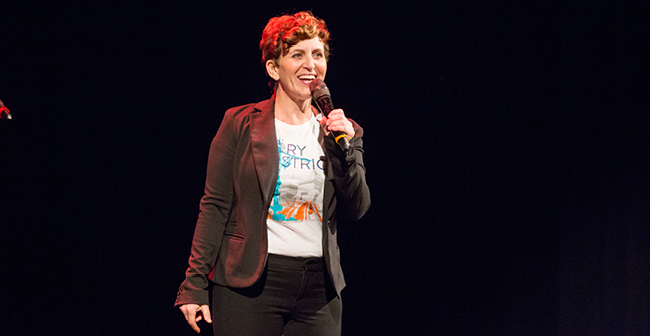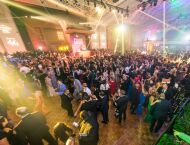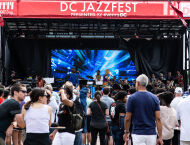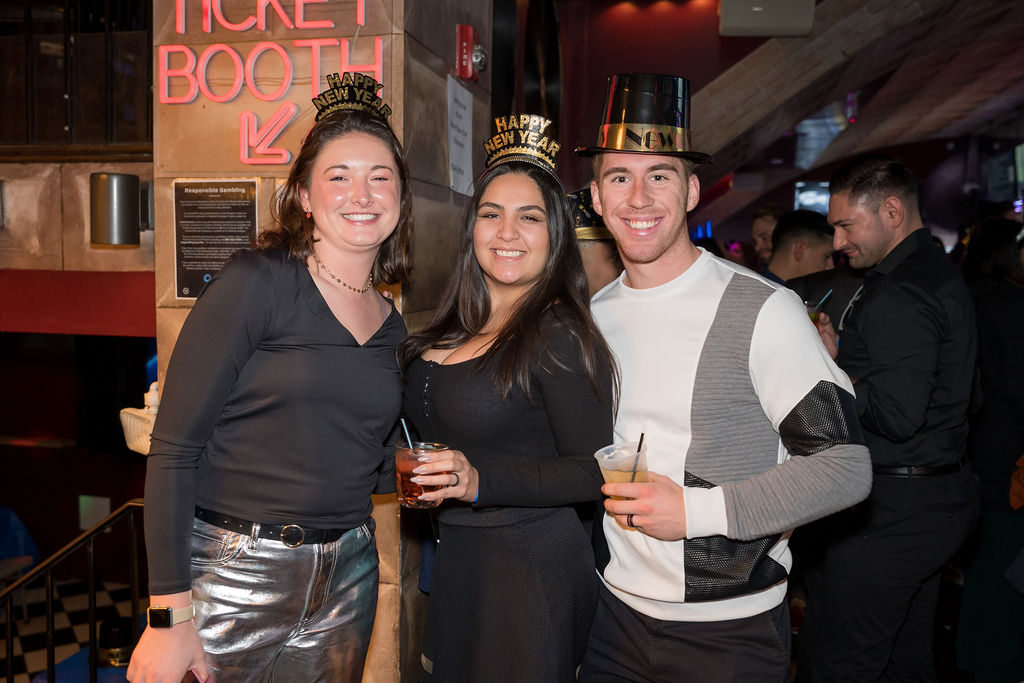Culture
 Photo: Courtesy of Story District
Photo: Courtesy of Story District
Storytelling in the City: How Washingtonians Share Their Stories
July 29, 2017 @ 12:00am
It’s something you do all the time, in lots of different places. You do it on social media when it’s your friend’s birthday, with a perfect candid and a heartfelt caption. You do it over the phone with parents who ask about every detail. You do it at happy hour or over coffee with friends you don’t see often enough. Storytelling is part of our everyday lives.
It can express affection, build empathy, bear witness to injustice or make somebody laugh. In DC, it takes countless forms, and it’s not always recognized as storytelling. It can take shape as a spoken word poem practiced for rhyme and cadence, a standup routine with a perfectly timed punch line, a personal essay with plans to be published, a poem scribbled onto the back of a napkin or a story with no purpose other than to be told to an audience. Regardless of how the story sounds, Washingtonians need outlets for their narratives, and countless organizations are delivering
DC Improv
When it comes to open mics, poetry and literature are not the only options. Standup comedy is one of the most mainstream forms of oral storytelling, even if we don’t usually think of it that way.
Antoine Griffin produces DC Improv’s monthly open mic nights, which he brought back after years of being discontinued. He says he revived them to give DC comics a place to test out new material, and budding comics a chance to make people laugh.
DC Improv’s open mic nights aren’t completely open, however, as potential comics need to submit a tape for approval from Griffin before taking the stage. The tradeoff, though, is that newer comics who still have some experience get to entertain the crowds that Griffin says are native to DC.
“A lot of the time at the club, I do hear people saying that comics are like the last philosophers,” Griffin said. “[Comedy is] the last place where people can go and hear the truth, and accept it in the form of laughter. It’s almost a safe space for truth, and I think that’s what you get out of the story in comedy.”
A lot of people might not take comedy seriously. It’s supposed to make you laugh, so how serious can it be? But the act of hearing live storytelling – whether it’s a personal narrative or a take on politics – is a seriously intimate one.
“We have close to 300 people in one pretty tight-fitting area,” Griffin said. “And once the light goes out, it becomes a very intimate experience between the comic and the crowd, where the feeling and the laughter all come together in one great ball of fun where everyone is experiencing it together.”
DC Improv’s next open mic night is on August 24. RSVP or submit a tape at www.dcimprov.com.
The Inner Loop
I would be remiss if I didn’t mention my first post-graduation internship and introduction to DC’s literary community. The Inner Loop hosts monthly events, providing an opportunity for writers to share their work in three genres: fiction, nonfiction and poetry.
Cofounded by Rachel Coonce and On Tap writer Courtney Sexton, the Inner Loop also hosts a podcast as well as regular events. Writers vary from those who have been published multiple times to those who have just begun their journeys as storytellers.
Like Sunday Kind of Love, the subject matter is just as diverse as the city it’s read in. While DC’s population continues to change, it’s important not to forget that those who are native to the area have just as much of an impact on the stories we hear.
“All of these different people come together to hear and be influenced by one another, because other people’s stories inform our own and enrich our experience of the world,” Coonce said.
The Inner Loop hosts events once a month on either Tuesdays or Thursdays. Stay up-to-date on events and submit your work via www.theinnerlooplit.com.
Spit Dat
When it comes to community-driven organizations, you’d be hard pressed to find any organization more driven by the people who attend its events than Spit Dat. As a spoken word open mic, Spit Dat separates itself from the competition because it’s a collective born of genuine friendship.
Spit Dat cohosts Dwayne Lawson-Brown and Drew Anderson have imbued their organization with inside jokes and traditions that their regular audience members are often in on. They explain their Spit Dat traditions before every open mic, bringing Spit Dat itself to life with storytelling each week.
Despite Spit Dat’s rich and often funny history, its story is easily outdone by the local talent. According to Lawson-Brown, spoken word poetry is just storytelling with passion.
“Folks expect a certain level of energy or bravado, but a lot of my favorite spoken word pieces are more withdrawn [and] quiet,” Lawson-Brown said. “They bring you in to the person. Spoken word is poetry shared with a passion, and that passion can look many different ways.”
Although all storytelling contains an element of performance, spoken word can seem daunting because of the rhythm it requires. But with the supportive crowds at Spit Dat’s weekly events, there’s no better place to try it out. And the storytelling aspect is as therapeutic at Spit Dat as it is everywhere else.
“People come in here and share things that they wouldn’t share with the people in their lives who the poem is about,” Anderson said. “They feel comfortable enough. It’s [like] community and church in the different ways that people describe it.”
Spit Dat holds an open mic every Thursday. Follow Spit Dat’s journey at www.spitdat.wix.com/dc.
Split This Rock
To outsiders, DC looks like a strictly government town. But our stories sound how our city looks: diverse. Some organizations make it their raison d’être to provide a space for unheard stories to be told. For Split This Rock’s Sarah Browning, traditionally unheard voices are some of the most important.
Split This Rock is a poetry reading series with a focus on provoking social change, hosting monthly events called Sunday Kind of Love with two featured readers followed by an open mic. Seasoned writers and amateur poets alike are welcome.
“A huge amount of what is exciting and dynamic in American poetry right now is being written by people of color, and queer poets and trans poets, and people with disabilities, and anybody who’s not reading that work is missing the boat,” Browning said. “They’re missing what’s exciting in American poetry.”
The kinds of stories told at Sunday Kind of Love are the ones we know are out there but don’t hear often enough. Browning says she frequently listens to poetry dealing with the effects of gentrification, violence and racism. Although the poems can get heavy, the environment at Sunday Kind of Love events is always conducive to healing and community.
“It can be incredibly painful and uncomfortable, but it’s a great honor to hear it, to be given the gift of just listening,” Browning said. “A lot is said about healing, and who knows how much it’s healing? That’s not for us to say as audience. It’s the poet or storyteller who feels compelled to tell, and so we listen. That’s what we can give, right? We listen.”
Sunday Kind of Love takes place the third Sunday of every month. Catch the next one on August 20, and learn more about Split This Rock at www.splitthisrock.org.
Story District
When it comes to oral storytelling, Story District might just fit the bill as the most straightforward. Formerly called Speak Easy, Story District has become an award-winning DC staple.
At Story District, storytellers – many of them first-timers – are coached through a process where they get advice and feedback. They then take the stage at Story District’s monthly events and deliver a personal, nonfiction narrative. According to Story District’s Artistic Executive Director Amy Saidman, DC’s rich storytelling culture is in part due to its history of spoken word.
“It’s a city full of intellectuals, wordsmiths and curious people,” Saidman said.
Although it’s gone by different names, Story District has been around since the 90s. While listening to a story live may not be everyone’s idea of evening entertainment, the environment that live storytelling provides is one of the reasons DC has allowed its storytellers to thrive.
“You’ll hear it over and over again,” Saidman says. “Our audiences are some of the warmest [and] most welcoming and open audiences you’ll find.”
In addition to themed monthly events, Story District hosts educational workshops. Get details on upcoming events and their themes, and submit your pitch at www.storydistrict.org.
DC Improv: 1140 Connecticut Ave. NW, DC; www.dcimprov.com
Inner Loop: Various locations around NW, DC (most commonly at Colony Club at 3118 Georgia Ave. NW, DC); www.theinnerlooplit.com
Spit Dat: The Emergence Community Arts Collective at 733 Euclid St. NW, DC; www.spitdat.wix.com/dc
Split This Rock: 1301 Connecticut Ave. NW, DC (and various Busboys & Poets locations); www.splitthisrock.org
Story District: 3329 Georgia Ave. NW, DC (and various locations around the DC area); www.storydistrict.org








